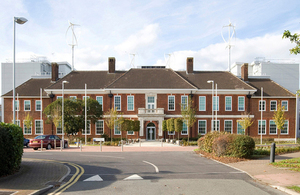Celebrating 100 years of scientific expertise: APHA’s Weybridge laboratory reaches its centenary
The Animal and Plant Health Agency’s central laboratory and headquarters near Weybridge, Surrey is celebrating its 100th anniversary.

Weybourne building
The Weybridge site is an internationally recognised veterinary research and laboratory testing facility. It has a remit to protect the nation from a wide range of diseases which can affect both livestock and in some instances, human health.
Most recently Weybridge tested several thousand samples for avian influenza following the outbreak of the H5N8 HPAI virus in farmed and wild birds found in the United Kingdom (UK) and across Europe in winter 2016/17. It was at the heart of the UK and European Union (EU) science response, providing scientific evidence and advice to government in controlling the outbreak.
Weybridge tackles disease on the farm, through the food chain to the consumer as is demonstrated by its work on food-borne bacteria such as Salmonella and E-coli. It undertakes a wide range of diagnostic and international trade testing, including rabies testing to confirm vaccination success under the Pet Travel Scheme. It is also at the forefront of research for bovine tuberculosis (TB) and undertakes vital work on the global problem of antimicrobial resistance.
APHA’s Chief Executive Officer Chris Hadkiss said:
I am very proud to be the Chief Executive of an agency which has a laboratory with such a long and prestigious history. The work carried out at the Weybridge site has earned great respect on a global level for the advances it has made in both veterinary and scientific research. Such an accomplishment is of course due to the very high calibre of staff who have worked and continue to work with such dedication.
Over the past 100 years the laboratory has continued to provide vital services to the nation during 2 world wars, has aided the eradication of major diseases within the UK such as rabies and foot and mouth disease, and has identified new diseases, including BSE in the 1980s. It continues to undertake vital research that will benefit both human and animal health in the UK and across the world.
UK Chief Veterinary Officer Nigel Gibbens said:
The work of government and private veterinarians and the work undertaken at Weybridge is inextricably linked in protecting animals in agriculture, the food supply and human health. Just as 100 years ago, vets responding to suspicion of notifiable or new and emerging disease gather samples on farm, which are sent to Weybridge where vital testing and analysis takes place to reach a diagnosis.
The APHA’s Weybridge laboratory has an impressive record in responding quickly and effectively to new diseases in animals and significantly advancing our understanding of how we can control them. It is reassuring to know that this work still continues to this day and will do so into the future.
History
APHA’s central laboratory has been based at the same site since 1917, when it was known as the Addlestone Institute. The laboratory’s origins can however be traced back to 1894, when a veterinary diagnostic service was established in a single basement room at Whitehall, London. In 1917, the Addlestone Institute was run under the directorship of Sir Stewart Stockman, the Chief Veterinary Officer of the day, and was staffed by six veterinary officers and nine support staff.
The site continued to expand, particularly throughout the 1930s. It was at this time that TM Doyle, based at the laboratory, discovered a new disease in poultry which he named ‘Newcastle disease’, after it was detected on a farm in Newcastle upon Tyne.
During the Second World War, the number of staff almost doubled and women were employed at the laboratory for the first time. The laboratory played an important role in protecting the national food supply in helping to prevent diseases that could impact on animal production. In 1939 it also began an urgent programme for the mass production of anthrax vaccine and antiserum so the country would be able to respond to the threat of a biological warfare emergency.
More recent past achievements include eradicating swine fever in the 1960s, characterising the first case of BSE in the 1980s (and then in 2004 confirming the first case in the USA) and developing the first licensed vaccine for TB in badgers in 2009.
Today and the future
Today the laboratory continues to be at the forefront of veterinary research and diagnosis. There are around 800 people occupying the site, which includes teams not just from APHA but also other parts of the Department for Environment, Food and Rural Affairs (Defra) and its agencies who are specialists in science, policy making, administration and farm working.
In recognition of the vital work undertaken at Weybridge, APHA has recently secured £60m capital investment from the government to further develop the site as well as APHA’s regional Veterinary Investigation Centres.
Despite the passing of 100 years, APHA’s scientific aims remain much the same - that is to protect Great Britain against the threat and impact of a wide variety of animal diseases and other species risks, many of which affect humans.
To read more about the work undertaken at APHA’s Weybridge laboratory and its history take a look at the APHA science blog and the Government Veterinary Services blog.